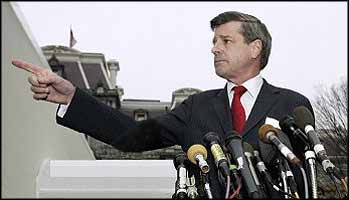Helen Thomas
The raid by the U.S.-appointed Iraqi officials on an Arab television network bureau in Baghdad and the ban on its broadcasts hardly fits my idea of how to spread democracy in the Middle East. Isn’t that the first thing dictators do—shut down broadcast outlets and newspapers? For those in power, tolerating a free press is difficult, even in a democracy. As a foreign occupier in Iraq, we are proving that it is intolerable.

USA overseer Paul Bremer claims to be allowing free expression whilst closing newspaper offices, arresting reporters, and terrorising unarmed dissidents.
The terrible irony here is that we pride ourselves on offering a model to the rest of the world on how to design—and live by—our constitutional freedoms. Journalists around the globe have been taught to emulate our approach to newsgathering, in an atmosphere, it is hoped, free of government restraints. At the same time, we’re snuffing out news outlets we don’t like.
On Monday, the U.S.-appointed Iraqi government raided the Baghdad bureau of the Al-Arabiya TV network. The network’s crime was to broadcast an audiotape from Saddam Hussein complaining about Iraqis who were cooperating with the U.S. occupation force and calling for resistance. The tape had been sent to Al-Arabiya’s headquarters in Dubai, the United Arab Emirates.
The network, which has interviewed Secretary of State Colin Powell, is one of the largest TV outlets in the Arab world. Any tape portraying Hussein’s views on life fits the definition of news, if for no other reason than it is evidence that he is still alive and able to secretly communicate from wherever he was hiding.
Al-Arabiya and its competitor, the al-Jazeera Satellite Channel, have a wide following in the Middle East. Al-Jazeera caused Washington much discomfort in the lead-up to the war by broadcasting statements from Hussein. The White House offered “advice” to U.S. TV to shun those tapes, but the American networks generally ignored the unhelpful hints. Defence Secretary Donald Rumsfeld has accused both Arab stations of being hostile by covering news of the guerrilla attacks on American forces.
Al-Jazeera’s Baghdad bureau was hit by a U.S. missile on April 8, killing a reporter-cameraman. The network also said its marked vehicle was attacked April 7. On Nov. 13, 2001, during the U.S. war on Afghanistan, an American missile went “awry,” according to the Pentagon, and destroyed the Al-Jazeera bureau in Kabul.
The Committee to Protect Journalists in New York has condemned the move against Al-Arabiya, noting that “statements from Saddam Hussein and the former Iraqi regime are inherently newsworthy and news organizations have a right to cover them.”
Rumsfeld grouses that the two networks were violently against the American coalition. He hopes to counter their influence when a U.S.-controlled TV satellite channel begins broadcasts next month. Then will the Iraqis and the Arab world be guaranteed the truth?
In a brilliant speech earlier this month before the National Conference on Media Reform, broadcaster and former editor Bill Moyers warned that American media conglomerates may find common cause “with an imperial state.” But Moyers said “the greatest moments in the history of the press came not when journalists made common cause with the state, but when they stood fearlessly independent of it.” Against that statement of values, the recent performance by American journalists does not measure well.
White House and Pentagon reporters initially pulled their punches in reporting on the Iraq war. Some media outlets did not want to rock the boat by showing grisly photos or videotape that could be disturbing to Americans. As a result, many Americans tuned in on foreign news channels to get the full picture of the war.
Even now, with the administration’s pro-war arguments reduced to a pile of confetti, many news outlets have failed to demand accountability from the Bush administration for what appears to be systematic dishonesty in trying to justify the U.S. attack. This failure, and the U.S.-led suppression of newsgathering in Iraq show, that the historic American model for a free and independent press needs courageous bolstering.
Article courtesy of San Francisco Chronicle